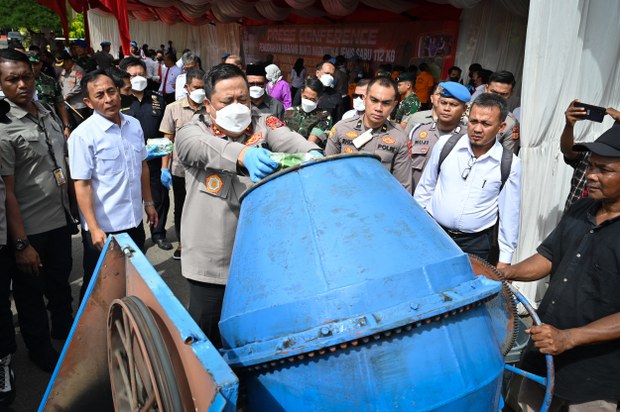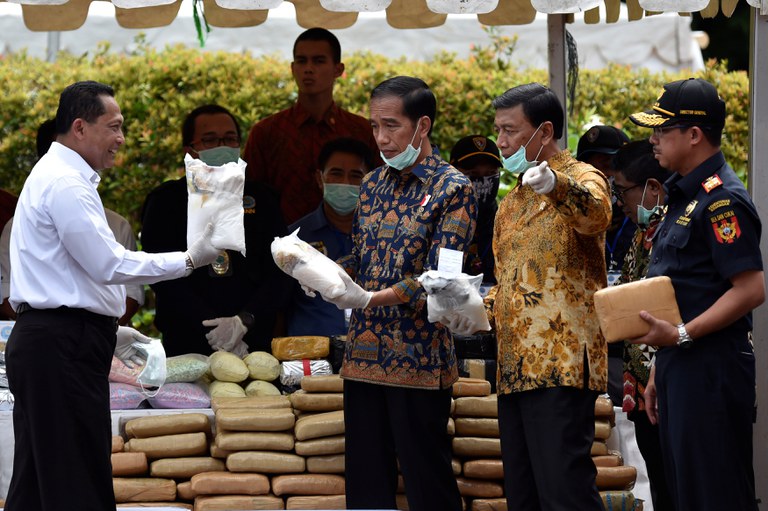Indonesian court condemns 8 Iranians to death for drug smuggling
2023.10.27
Jakarta
 Indonesian police officers at the regional police headquarters in Banda Aceh dump methamphetamine into a cement mixer as they destroy more than 100 kg. seized during a two-month period, Oct. 11, 2023.
Indonesian police officers at the regional police headquarters in Banda Aceh dump methamphetamine into a cement mixer as they destroy more than 100 kg. seized during a two-month period, Oct. 11, 2023.
An Indonesian court on Friday ordered that eight Iranian nationals be executed for smuggling more than 700 pounds of crystal methamphetamine by sea into Java.
Indonesia has one of the world’s toughest anti-drug laws and has executed several foreign and local drug offenders in recent years, despite condemnation from other countries.
The Iranians were arrested in early 2023 after authorities found the stash hidden aboard a ship that brought them to Banten, a province on the western tip of Java island.
The Serang District Court in Banten, about 100 km (62 miles) west of Jakarta, found the defendants guilty of trafficking the drug.
“We hereby sentence the defendants to the death penalty,” Uli Purnama, who led the three-judge panel, said Friday as he read out the verdict following the trial.
The defendants, who attended the trial with interpreters, said they were considering appealing the verdict. They have seven days to challenge it.
A joint team from the National Narcotics Agency and the customs department seized 319 kg (703 pounds) of methamphetamine hidden under the fuel tank of their ship when the men were arrested in February. Sniffer dogs found 309 packages containing the drug.
The men had been sailing without documents in the waters south of Java.
Prosecutors had sought to spare one of the defendants, Amir Naderi, from being sent to death row. They said he had shown law enforcers where the methamphetamine was stowed away on the ship.
The judges rejected that request, sentencing him to die with the others.
During Friday’s courtroom session, the judges heard that the smuggling operation began in January when a man named Ali Baluchazai, who is still at large, asked one of the defendants, Abdul Rahman Zardkuhi, to deliver methamphetamine to Indonesia by sea by promising 80 million Iranian rials (U.S. $1,883).
Zardkuhi then recruited the other defendants, divided the money and departed by boat from Pozm Port, about 1,700 km. (1,056 miles) southeast of Tehran, the prosecution said. They received the methamphetamine package on their way and continued sailing to Indonesian waters.
Indonesia has one of the world’s toughest anti-drug laws and has executed several foreign and local drug offenders in the past. In July 2016, four drug convicts were shot by firing squad on an island off Java.
Those executions occurred 15 months after eight convicts, including an Indonesian and two Australians, were executed in the same manner.
Indonesian courts can impose death sentences for other crimes including terrorism and murder despite international pressure to stop this practice.
The country faces a growing drug abuse problem among its population of more than 270 million people. Indonesia is home to an estimated 3.6 million drug users, according to a 2022 report by the National Narcotics Agency.

Indonesian President Joko “Jokowi” Widodo has defended the use of capital punishment as a deterrent against drug trafficking and abuse, saying the country was facing a “national emergency.”
He has repeatedly rejected clemency pleas from drug convicts and has said he would not compromise on the issue.
“I have said it before, we must be firm. Especially for the foreign drug dealers who resist, just shoot them right away. Don’t give them any mercy,” Jokowi said in 2017.
Rights activists: No deterrent effect
Still, human rights activists and legal analysts have questioned the effectiveness and fairness of Indonesia’s anti-drug policy and called for a moratorium on executions.
Under the new criminal code passed last year, judges can impose death sentences with a probationary period of 10 years, after which the sentence can be reduced to life in prison.
Usman Hamid, executive director of Amnesty International Indonesia, criticized the court’s decision to hand down death sentences to the Iranians.
“We are not against punishment for people who are proven to have committed crimes, but the death penalty does not have a deterrent effect and has been proven to be ineffective in preventing narcotics crimes,” he told BenarNews.
Amnesty International opposes capital punishment in all cases and has called on Indonesia to abolish it, he said.
The human rights group said that as of this month, at least 229 people are on death row in Indonesia, most of them for drug-related offenses.
In August, Indonesia’s state news agency Antara reported that the Banda Aceh High Court had upheld death sentences this year for 12 drug offenders convicted of crimes in Aceh province.







